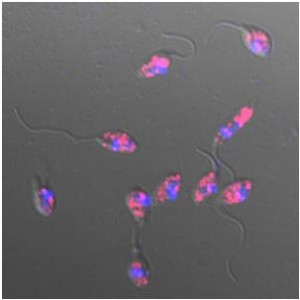A recent study in the journal Science, found that a parasite and a virus are teaming up to increase its ability to harm humans. [1]
Viral infections appear red in this photo of the parasite Leishmania; the parasites’ nuclei are blue. New evidence published in Science this week suggests that these infections may help Leishmania cause more harm when it infects animal and human hosts. (Credit: Nicolas Fasel, PhD, Univ. of Lausanne in Switzerland)
An infection, known as leishmaniasis, is caused by the parasite Leishmani. This disease is mainly spread by sand fly bites. Symptoms of this infection are, large skin lesions, fever, swelling of the spleen and liver, and, in more serious forms of the disease, disfigurement and death. According to the article, this disease affects over 12 million people worldwide. The article can be found here.
The virus infects hosts by a Trojan Horse technique. “The strategy of the “Trojan horse” as a mechanism of pathogenicity of intracellular microorganisms is, to avoid the immune system and its memory function cleverly, with phagocytosis of infected and apoptotic neutrophils by macrophages, employing the non-danger surface signals of apoptotic cells.” From Wikipedia.
How the virus is increasing the pathogenicity is a fascinating question for researches right now. It may open up new opportunities for finding its cure.
This is the first time I have ever heard of this disease. Although this disease seems very serious, and will never deter me from enjoying the sunny beaches of Central and Southern America.
- A. Ives, C. Ronet, F. Prevel, G. Ruzzante, S. Fuertes-Marraco, F. Schutz, H. Zangger, M. Revaz-Breton, L.-F. Lye, S. M. Hickerson, S. M. Beverley, H. Acha-Orbea, P. Launois, N. Fasel, S. Masina. Leishmania RNA Virus Controls the Severity of Mucocutaneous Leishmaniasis. Science, 2011; 331 (6018): 775 DOI:10.1126/science.1199326


2 responses to “Be cautious if traveling south during reading break”